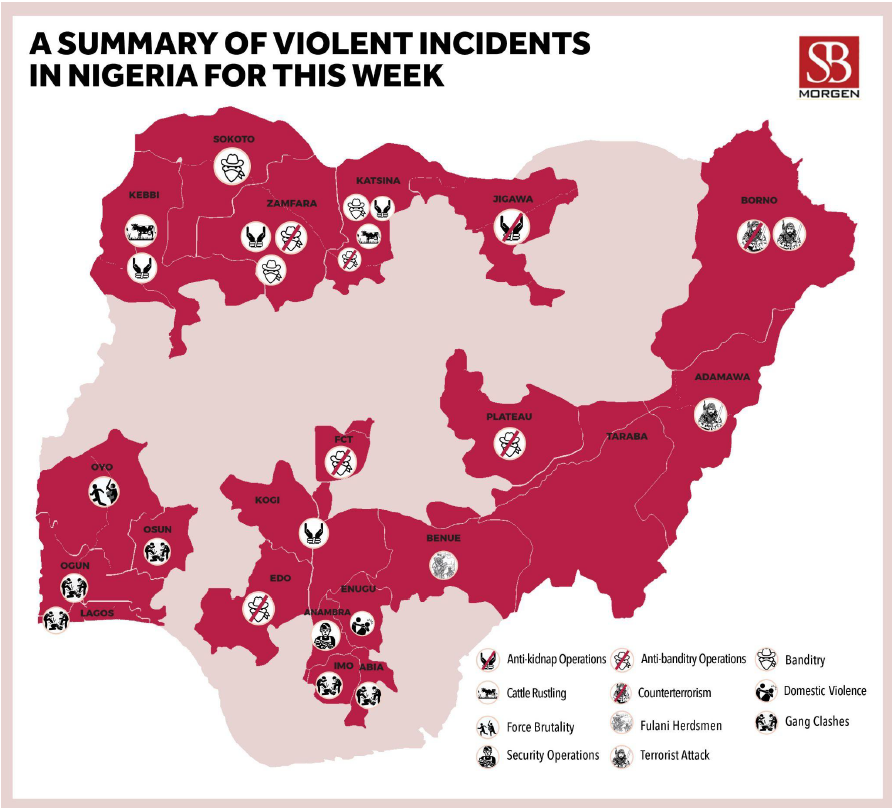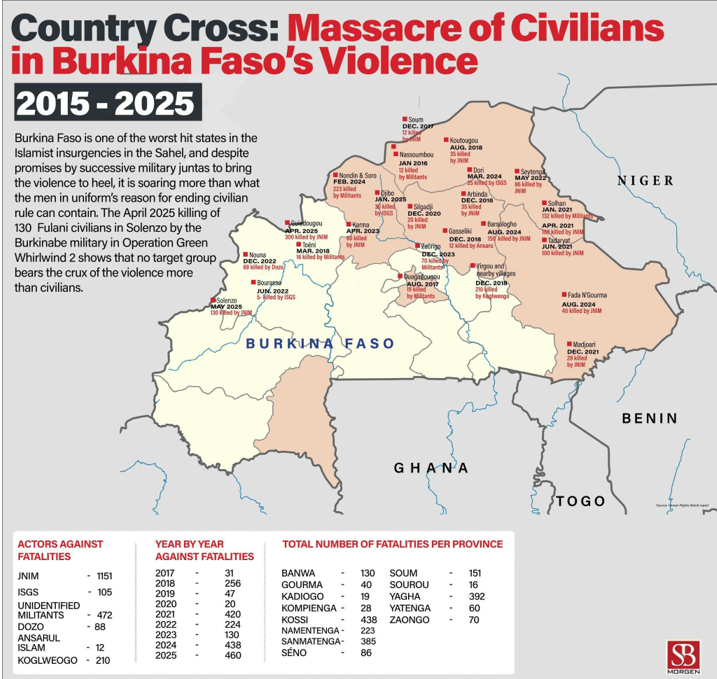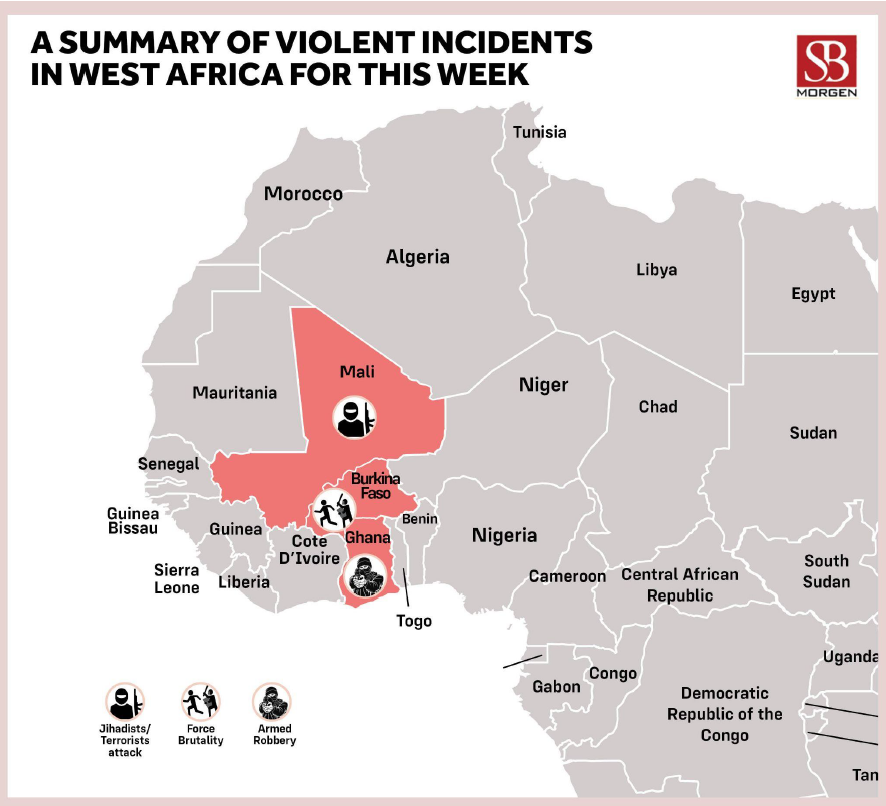The past week in Nigeria has underscored a chilling reality: the country’s long-standing struggle with security force impunity, insurgency, and governance vacuum is not abating—it is accelerating. From the rural farmlands of Benue to the insurgent-riddled villages of Borno and the volatile borders of Anambra and Imo, violence has intensified, deepened by economic despair and state inaction. The pattern is no longer random—it is systemic.
Insurgents Reassert Control in the Northeast
The massacre of at least 23 farmers and fishermen in Malam Karanti, Borno State, reflects a deliberate campaign of territorial assertion by Islamic State West Africa Province (ISWAP). These victims—who had paid levies to a rival Boko Haram faction to access farmland—were executed in what ISWAP viewed as a betrayal. This illustrates how extremist factions are not only waging war against the state but also regulating economic life in the vacuum left by government absence.
SBM reports that nearby, in Kulda, Adamawa State, Boko Haram operatives killed three Civilian Joint Task Force (CJTF) members and razed homes—an act clearly designed to dismantle grassroots resistance. Though Nigerian troops claimed a tactical win in Damboa by neutralising seven insurgents, such gains remain fleeting without sustained counter-insurgency strategy and deep community intelligence.
Food Insecurity Deepens in the Middle Belt
In Benue State, once proudly known as Nigeria’s “Food Basket,” violence is crippling agriculture. The targeted killing of 15 traders returning from Oweto Market in Agatu underscores the herder-farmer conflict’s lethal grip on rural communities. The National Bureau of Statistics reported an alarming year-on-year food inflation rate of 51.76% in April 2025—up from 23.3% just a month earlier. This crisis is not just humanitarian—it is economic, threatening national food security.
Kogi State’s Yagba West LGA has seen escalating abductions, including the kidnapping of a monarch and vigilantes. Community resistance is weakened by minimal state policing—some wards have only two government-assigned hunters—leaving villages exposed to increasingly coordinated rural banditry.
Northwest Nigeria: Bandits Grow More Insurgent
In Zamfara and Sokoto States, the transformation of bandits into full-fledged insurgents is well underway. Attacks on rural roads, commuter vehicles, and even the ancestral home of Sokoto’s Deputy Governor Idris Gobir indicate strategic escalation. Bandit leader Kallamu, linked to terror kingpin Bello Turji, executed the Garin Idi raid, sending a clear message: no one is beyond reach.
A chilling development occurred in Kebbi State, where attackers stormed a church in Zagani village during service—a move suggesting a shift from economic to potentially religious targets. Security lapses and porous borders have allowed groups like the Lakurawa to entrench themselves after being displaced from neighbouring regions.
Southeast: Border Militancy Escalates
Ihiala in Anambra State continues to be a flashpoint for IPOB/ESN-linked violence. With its strategic border position between Anambra and Imo, and thick forests providing natural cover, Ihiala has become a launchpad for cross-border insurgent attacks. Despite the establishment of local vigilantes and checkpoints, the lack of coordinated interstate security efforts has rendered government responses ineffective.

A recent attack on a brothel in Uli—resulting in the deaths of a soldier and a child—highlights the growing boldness of these separatist factions.
Edo State’s Vulnerable Hinterlands
Okpella in Edo State has seen a worrying spike in kidnappings, targeting clergy, commuters, and industrial workers along the Benin–Lokoja–Abuja expressway. The town’s proximity to the porous Edo–Kogi border and the concentration of high-value targets from major factories make it a prime hunting ground for ransom-seeking armed herdsmen. A recent police ambush in Okpella Forest illustrates the growing coordination of these criminal gangs.
Police Brutality and Urban Violence
In Ibadan, a police officer chasing a suspect through Gbagi Market shot and killed a student sitting for the West African Senior School Certificate Examination (WASSCE). This marks the 30th recorded incident of police abuse in 2025 alone, a continuation of the unchecked brutality that sparked the #EndSARS protests in 2020. Despite reform promises—including body cameras, retraining, and accountability measures—few have materialised. The Nigeria Police Act of 2020 remains largely unenforced.
Meanwhile, Lagos continues to battle rising cult violence. In Alimosho LGA, a member of the Eiye cult attacked his own brother. Other cult clashes have erupted in Egbeda, Ajah, and Aba, revealing a deeper problem: youth marginalisation, unemployment, and weak community surveillance.

Violence Spreads Beyond Nigeria
In Niger’s Tillabéri region, Islamic State militants ambushed a convoy between Kabongo and Zindigori, blocking essential humanitarian supplies. Similarly, Ghana’s Upper East Region witnessed the brutal killing of a health worker—a sign that violent instability is no longer Nigeria’s problem alone but a regional contagion.
Pathways Forward: Restoring Security Through Strategy and Governance
To halt this downward spiral, Nigeria must move beyond reactive firefighting and embrace strategic, coordinated action. The following are immediate, workable solutions:
- Establish a Unified Rural Security Framework:
Deploy mobile agro-security units with air surveillance and patrol capability to protect farmlands, transport corridors, and border communities—particularly in Benue, Zamfara, and Kebbi. - Revive and Fund the CJTF and Vigilante Units:
Community defence groups must receive structured training, logistics, and communication support. Their proximity to local intelligence is invaluable in early-warning systems. - Create an Interstate Security Task Force:
For regions like Ihiala and Okpella, security agencies from neighbouring states must coordinate joint operations, share intelligence in real time, and eliminate jurisdictional silos. - Reform Policing with Accountability:
Fully implement the Police Act. Recruit based on merit, enforce disciplinary measures, and deploy community policing models. Equip officers with non-lethal weapons and crowd-control training. - Tackle Root Causes of Urban Cultism:
Launch youth development schemes tied to job creation, vocational training, and mental health services. Establish a Community Safety Task Force involving local leaders and social workers.
The Nigerian government must now confront the crisis not with declarations but with sustained action. If Nigeria is to avoid total erosion of its state authority, it must treat insecurity as not merely a policing issue but a governance emergency demanding whole-of-society mobilisation.


 Trending
Trending 
